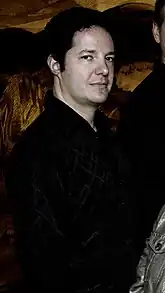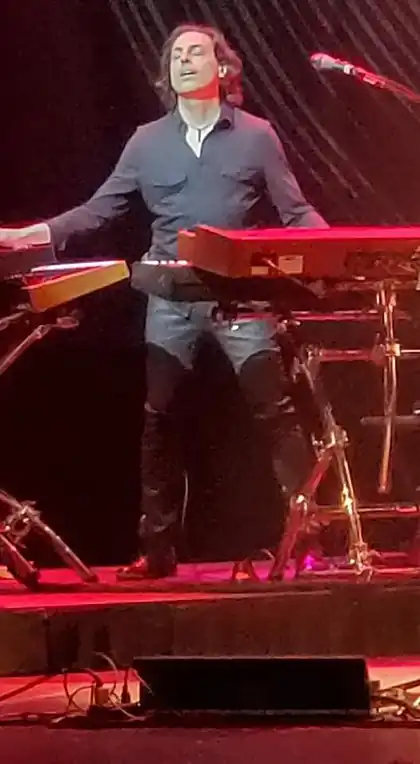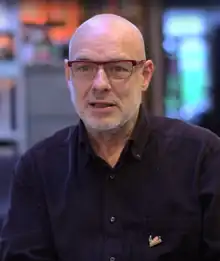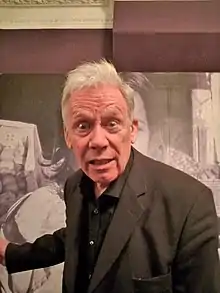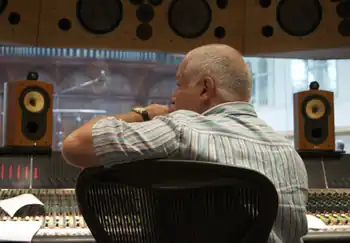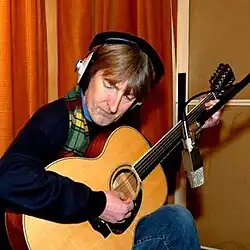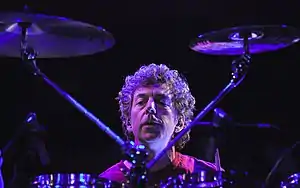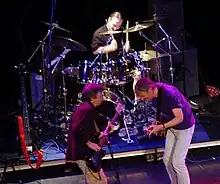

Camel are an English progressive rock band from Guildford, Surrey. Formed in October 1971, the group originally featured guitarist, flautist and vocalist Andrew Latimer, bassist and vocalist Doug Ferguson, keyboardist and vocalist Peter Bardens, and drummer Andy Ward. The band's current lineup includes Latimer, bassist, keyboardist and vocalist Colin Bass (from 1979 to 1981, and since 1984), drummer Denis Clement (since 2000), and keyboardist and saxophonist Peter Jones (since 2016).
History
1971–1984
Camel were formed in October 1971 by Andrew Latimer, Doug Ferguson, Peter Bardens and Andy Ward.[1] During the tour in promotion of the band's fourth studio album Moonmadness, the group's lineup became a quintet with the addition of former King Crimson saxophonist and flautist Mel Collins.[2] In early 1977, Ferguson was replaced by former Caravan bassist Richard Sinclair.[2] Bardens followed the next July, with his place taken by two former bandmates of Sinclair in Caravan – Jan Schelhaas and Dave Sinclair, Richard's cousin.[3] Both Sinclairs left after the Breathless tour.[2]
In early 1979, Camel returned with bassist Colin Bass and former Happy the Man keyboardist/flautist Kit Watkins in place of the Sinclair cousins.[2] Mel Collins also stepped back from the band as a full-time member, although continued to collaborate with them on occasion.[4] Neither of the band's keyboardists contributed to 1981's Nude, which featured Duncan Mackay, although they returned for the subsequent tour.[5] After the tour ended in mid-1981, Ward attempted to commit suicide after increasing drug and alcohol abuse, which led to the group all but disbanding that summer.[6][7]
As the only remaining member of Camel by early 1982, Andrew Latimer recorded The Single Factor with Alan Parsons Project members Chris Rainbow (keyboards, vocals) and David Paton (bass, vocals), while drums were covered by various guest contributors.[7] Kit Watkins rejoined the trio for the subsequent touring cycle, which also featured second guitarist Andy Dalby and drummer Stuart Tosh.[8] In January 1983, Ward – still a contracted member of the band – officially left Camel.[6] He was replaced by Paul Burgess, while Watkins was replaced by Kayak's Ton Scherpenzeel.[6]
1984–1999
After the release of Stationary Traveller, Colin Bass returned to Camel and Richie Close joined on keyboards for the resulting tour, which spawned the live release Pressure Points: Live in Concert.[9] Following the conclusion of the touring cycle, Camel remained dormant for much of the rest of the decade – Latimer and his former bandmates were involved in legal disputes with their former management company, in 1985 the group parted ways with Decca Records, and in 1988 the group's frontman decided to move to the United States, start his own label and build his own studio.[9]
In September 1991, Camel released their first studio album in seven years, Dust and Dreams, which featured a lineup of Andrew Latimer, Colin Bass, Ton Scherpenzeel and Paul Burgess, in addition to several guests.[10] The band started touring again the following year, with Scherpenzeel replaced by Mickey Simmonds.[6] On 5 March 1993, Latimer's father Stan died, leading the band to take another hiatus and delay the release of the live album Never Let Go.[11] As of spring 1994, Latimer had begun writing a new album, and the group's lineup still included Bass, Simmonds and Burgess.[12]
Recording for the album, Harbour of Tears, commenced in March 1995 with Latimer, Bass and Simmonds joined by session contributor John Xepoleas.[13] After the album's release in January, the group were due to embark on another tour, however shortly before its commencement Simmonds announced that he was leaving the band to spend more time with his family, forcing the remaining members to postpone the tour.[14] Simmonds and Burgess were eventually replaced by Fish members Foss Patterson and Dave Stewart, respectively, and the tour took place during 1997.[15]
Since 1999
Andrew Latimer, Colin Bass and Dave Stewart released Rajaz in 1999, which featured keyboards performed remotely and sent to the band by Ton Scherpenzeel.[9] For the tour in promotion of the release the following year, Guy LeBlanc took over the vacant keyboardist position in March 2000.[16] However, just two weeks after his arrival, Stewart announced that he would be leaving the group; his position was briefly taken by former Jethro Tull drummer Clive Bunker, before LeBlanc brought in former bandmate Denis Clement just ten days before the start of the tour in August.[16]
In 2003, the band embarked on a 'farewell' tour. Due to a family emergency, LeBlanc was unavailable for the tour's duration; he was replaced by Tom Brislin for the North American leg in June, and later by Scherpenzeel for the European leg in October.[17] Ten years later, after Latimer recovered from several years of illness, Camel returned on the Retirement Sucks Tour with special guest keyboardist Jan Schelhaas.[18] In October, Schelhaas was replaced by Renaissance keyboardist Jason Hart, as the group planned to continue touring in 2014 which would present scheduling conflicts.[19]
LeBlanc was forced to sit out Camel tours starting in February 2014 due to ill health, with Scherpenzeel returning again in his place.[20] LeBlanc eventually died of kidney cancer on 27 April 2015.[21] In February 2016, Peter Jones took over on keyboards.[22]
Members
Current
| Image | Name | Years active | Instruments | Release contributions |
|---|---|---|---|---|
| Andrew Latimer | 1971–present |
|
all Camel releases | |
| Colin Bass |
|
|
| |
| Denis Clement | 2000–present |
|
all Camel releases from The Paris Collection (2001) onwards, except Moondances (2007) | |
| Peter Jones | 2016–present |
|
|
Former
| Image | Name | Years active | Instruments | Release contributions |
|---|---|---|---|---|
| Andy Ward | 1971–1983 (inactive 1981–83) |
|
| |
| Peter Bardens | 1971–1978 (died 2002) |
|
| |
| Doug Ferguson | 1971–1977 |
|
| |
| Mel Collins | 1976–1979 |
|
| |
| Richard Sinclair | 1977–1979 |
|
| |
| Jan Schelhaas | 1978–1981 (touring 2013) |
|
| |
| Dave Sinclair | 1978–1979 | Breathless (1978) – two tracks only | ||
| Kit Watkins |
|
|
| |
| Chris Rainbow | 1982–1984 (died 2015) |
|
| |
| David Paton | 1982–1984 |
|
| |
| Andy Dalby | 1982–1983 | guitar | On the Road 1982 (1994) | |
| Paul Burgess | 1983–1994 |
|
| |
| Ton Scherpenzeel | 1983–1991 (session 1999, touring 2003, 2014–16) |
|
| |
| Richie Close | 1984 (died 1991) | keyboards | Pressure Points: Live in Concert (1984) | |
| Mickey Simmonds | 1992–1996 |
| ||
| Dave Stewart | 1996–1999 |
|
| |
| Foss Patterson | 1996–1997 |
|
Coming of Age (1998) | |
| Guy LeBlanc | 2000–2015 (until his death; inactive 2014–15) |
|
| |
| Clive Bunker | 2000 |
|
none – studio rehearsals only | |
| Jason Hart | 2013–2016 |
|
In from the Cold (2014) |
Touring
| Image | Name | Years active | Instruments | Details |
|---|---|---|---|---|
| Stuart Tosh | 1982 |
|
Tosh replaced Andy Ward for tour dates in 1982 while he was still a member, appearing on the album On the Road 1982.[8] | |
| Tom Brislin | 2003 |
|
Brislin substituted for Guy LeBlanc, who was unavailable due to a family emergency, on a North American tour in June 2003.[17] |
Session
| Image | Name | Years active | Instruments | Release contributions |
|---|---|---|---|---|
| David Bedford | 1975 | orchestral arrangements | The Snow Goose (1975) | |
| Martin Drover | 1977 |
|
Rain Dances (1977) | |
| Malcolm Griffiths | trombone | |||
| Brian Eno |
| |||
| Fiona Hibbert | harp | |||
| Phil Collins | 1979 | percussion | I Can See Your House from Here (1979) | |
| Rupert Hine | backing vocals | |||
| Simon Jeffes | orchestral arrangements | |||
| Duncan Mackay |
|
|
| |
| Chris Green | 1980 | cello | Nude (1981) | |
| Gasper Lawal | percussion | |||
| Herbie Flowers | tuba | |||
| Haydn Bendall |
|
|
| |
| Anthony Phillips | 1982 |
|
The Single Factor (1982) | |
| Francis Monkman | Synclavier | |||
| Jack Emblow | accordion | |||
| Tristan Fry | glockenspiel | |||
| Graham Jarvis | drums | |||
| Dave Mattacks | ||||
| Simon Phillips | ||||
| Christopher Bock | 1991 | Dust and Dreams (1991) | ||
| Don Harriss | keyboards | |||
| Kim Venaas |
| |||
| James SK Wān |
|
bamboo flute |
| |
| Mae McKenna | vocals | |||
| John Burton | French Horn | |||
| Neil Panton |
| |||
| John Xepoleas | 1994–1995 | drums | Harbour of Tears (1996) | |
| Barry Phillips | cello | |||
| Karen Bentley | violin | |||
| Anita Stoneham | ||||
| Terry Carleton | 2002 | percussion, drums | A Nod and a Wink (2002) |
Timeline
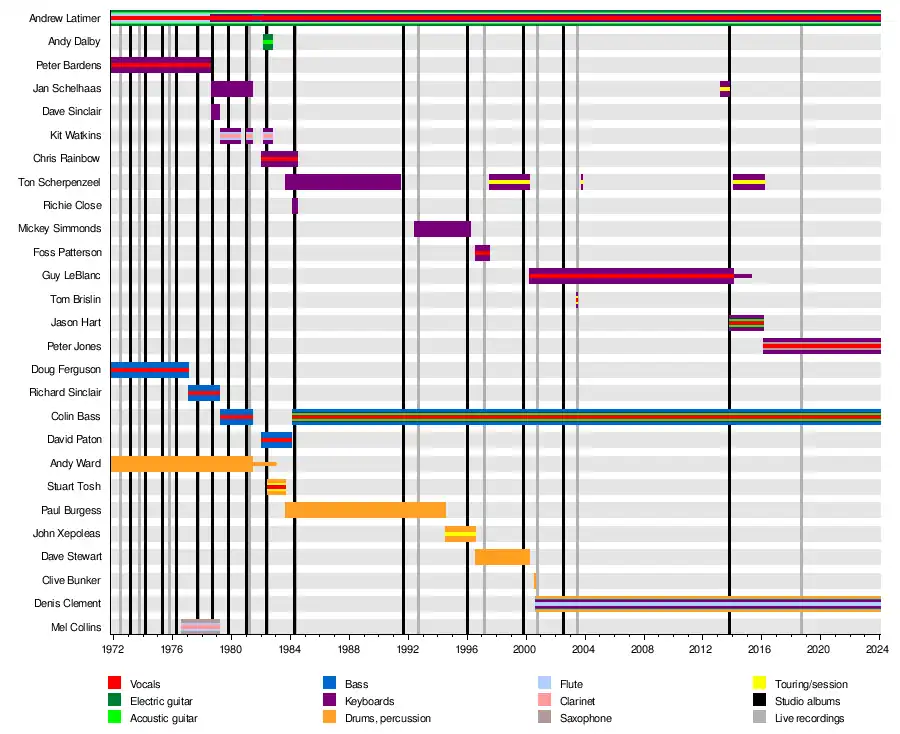
Lineups
| Period | Members | Releases |
|---|---|---|
| October 1971 – summer 1976 |
|
|
| Summer 1976 – early 1977 |
|
none |
| Early 1977 – July 1978 |
|
|
| July 1978 – March 1979 |
|
none |
| June 1979 – summer 1980 |
|
|
| Summer – autumn 1980 |
|
|
| January – mid-1981 |
|
|
| Early 1982 |
|
|
| Spring – autumn 1982 |
|
|
| Late 1983 |
|
|
| Early – summer 1984 |
|
|
| Summer 1984 – summer 1991 |
|
|
| Early 1992 – March 1993 |
|
|
| March – May 1995 |
|
|
| Summer 1996 – summer 1997 |
|
|
| Summer 1997 – March 2000 |
|
|
| March – April 2000 |
|
none |
| August 2000 |
| |
| August 2000 – early 2003 |
|
|
| June 2003 (North American farewell tour lineup) |
|
|
| October 2003 (European farewell tour lineup) |
|
none |
| Band on hiatus 2003–2013 | ||
| March – October 2013 |
|
|
| October 2013 – February 2014 |
|
|
| February 2014 – February 2016 |
|
none |
| February 2016 – present |
|
|
References
- ↑ "The Goose That Laid The Golden Egg". Record Collector. Retrieved 15 March 2020.
- 1 2 3 4 "Camel Timeline 1964-1981". Camel. Retrieved 15 March 2020.
- ↑ Larkin, Colin (27 May 2011). The Encyclopedia of Popular Music. London, England: Omnibus Press. p. 3029. ISBN 978-0857125958. Retrieved 15 March 2020.
- ↑ Eder, Bruce. "Mel Collins: Biography & History". AllMusic. Retrieved 15 March 2020.
- ↑ Strik, Henri. "Camel - Reissues 1978-1984". Background Magazine. Retrieved 15 March 2020.
- 1 2 3 4 Jones, Tim. "Has Anyone Seen My Camel?". Record Collector. Retrieved 15 March 2020.
- 1 2 Rathbone, Oregano (6 May 2019). "'The Single Factor': A Camel Classic That Wears Its Years Lightly". uDiscoverMusic. Retrieved 15 March 2020.
- 1 2 Connolly, Dave. "On the Road 1982 - Camel: Songs, Reviews, Credits". AllMusic. Retrieved 15 March 2020.
- 1 2 3 "Camel Timeline 1982-2002". Camel. Retrieved 15 March 2020.
- ↑ Connolly, Dave. "Dust and Dreams - Camel: Songs, Reviews, Credits". AllMusic. Retrieved 15 March 2020.
- ↑ Stroud, Harriet (1993). "On a Personal Note". The Nature of the Beast. Vol. 1, no. 1. Camel Productions. Retrieved 15 March 2020.
- ↑ Stroud, Harriet; Ford, Paris (1994). "New Camel Album: Keeping a Promise". The Nature of the Beast. Vol. 2, no. 1. Camel Productions. Retrieved 15 March 2020.
- ↑ Stroud, Harriet; Ford, Paris (1995). "Harbour of Tears: Camel's new studio album, 15th January 1996". The Nature of the Beast. Camel Productions. Retrieved 15 March 2020.
- ↑ Stroud, Harriet; Ford, Paris (1996). "To Tour or Not to Tour?". The Nature of the Beast. Camel Productions. Retrieved 15 March 2020.
- ↑ Melton, Jeff. "Camel '97: A Conversation with Andy Latimer". magenta.co.il. Retrieved 15 March 2020.
- 1 2 "Camel Timeline 2000-2002". Camel. Retrieved 15 March 2020.
- 1 2 "30-ish Anniversary Farewell Tour". Camel Productions. Archived from the original on 8 June 2003. Retrieved 15 March 2020.
- ↑ Kielty, Martin (21 March 2013). "Camel Return To Stage". Prog. Archived from the original on 29 April 2013. Retrieved 15 March 2020.
- ↑ "Rehearsal Snaps For Tour 2013". Camel Productions. Archived from the original on 29 October 2013. Retrieved 15 March 2020.
- ↑ Ewing, Jerry (18 February 2014). "Camel Forced To Change Keyboard Player For Tour". Prog. Retrieved 15 March 2020.
- ↑ Giles, Jeff (29 April 2015). "Camel Keyboard Player Guy LeBlanc Dies At 54". Ultimate Classic Rock. Retrieved 15 March 2020.
- ↑ Munro, Scott (8 February 2016). "Camel call up Tiger Moth Tales man Jones". Prog. Retrieved 15 March 2020.
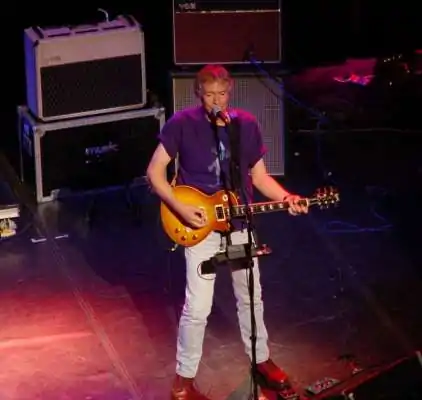

.png.webp)
.jpg.webp)
.jpg.webp)
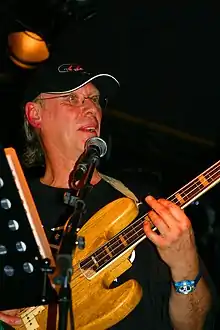
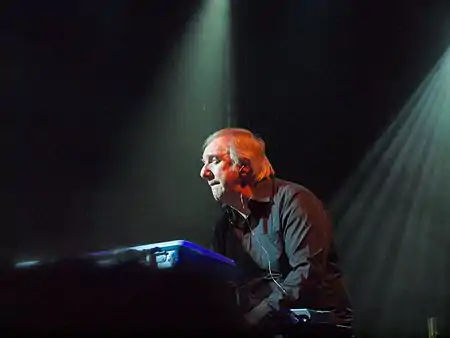
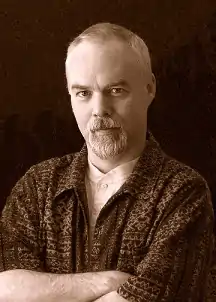

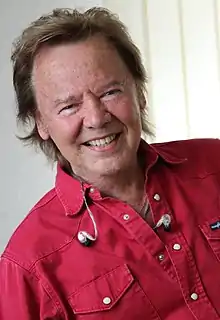
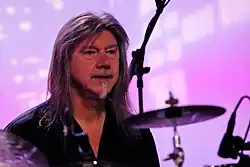
_(cropped).png.webp)
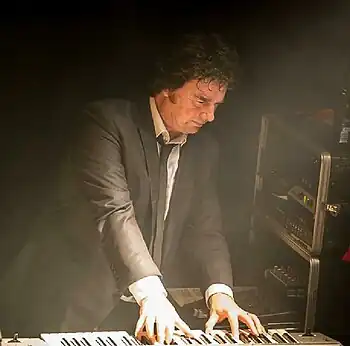
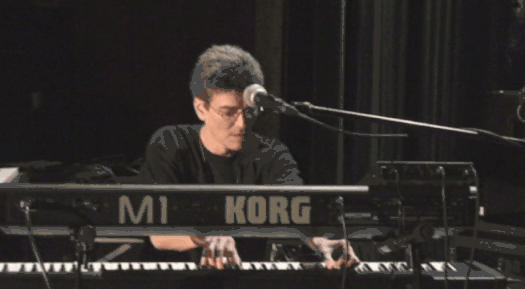
.png.webp)
